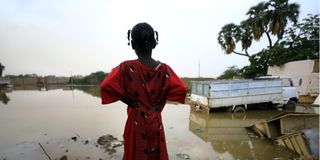Nile flooding poses no serious threat to Egypt despite damage in Sudan: official

A child looks at the floodwater in Khartoum, Sudan, August 26, 2020.
What you need to know:
- The Nile River is the main source of fresh water in Egypt, providing the country with 55.5 billion cubic meters of water annually.
- Although Egypt and Sudan are the two downstream Nile basin states, this year's flooding caused deadly damage in Sudan while Egypt is likely to pass it safely, mainly due to its giant High Dam that helps contain a large quantity of the flooding water.
The ongoing Nile River flooding poses no serious threat to Egypt despite the damage and casualties it caused to fellow downstream Nile basin country Sudan, an Egyptian official has said.
"The flooding situation in Egypt is different and the society here will not be seriously affected as it happened in other Nile basin states," Mohamed al-Sebai, spokesman of the Egyptian Ministry of Water Resources and Irrigation, told Xinhua.
The ministry's monitoring and forecasting center said that the Nile flooding is rather useful to Egypt this year, since there is an opportunity to use quantities of the flood water to refresh and improve the quality of the Nile water as well as reduce its pollution and the amount of ammonia in Egypt's Nile delta Rosetta branch, the spokesman added.
The Nile River is the main source of fresh water in Egypt, providing the country with 55.5 billion cubic meters of water annually.
Sebai pointed out that the flooding will continue in Egypt until the end of October, in light of the continuous rainfalls in upstream Nile basin countries.
The ministry recently announced that the Nile flooding this year is "high and likely to continue increasing," while the government assigned the ministry to set up an emergency plan.
Encroachment
Egypt has 13 riparian provinces along the Nile River that would be first affected by the flooding, located between Aswan in the south and Damietta in the north.
The biggest issue about these provinces is their encroachments in the course of the Nile, whether through construction or plantation on adjacent lands, making them the most vulnerable.
The encroachments lead to bottlenecks in the course of the river, and thus the incoming amount of water cannot be absorbed.
However, the water ministry's spokesman told Xinhua that "any possible damage will be limited in the Nile islands and riparian lands of the river, which are considered an integral part of the river's course itself."
Experts expect the Nile water level in Egypt to rise by about 120 centimeters, overwhelming the lowlands including islands and riparian buildings and crops.
Abbas Sharaqi, a professor of water resources at Cairo University, emphasised that the current flooding is not the most violent in the history of Egypt compared with those occurred in 1999 and 2000.
"But the difference is that Nasser Lake, the reservoir of Egypt's Aswan High Dam, has been filled early this year during the current flooding," said the Egyptian professor, attributing the current rise of the Nile water level in Egypt to the increasing water flow coming from the Ethiopian high central plateau.
Egypt safe
Although Egypt and Sudan are the two downstream Nile basin states, this year's flooding caused deadly damage in Sudan while Egypt is likely to pass it safely, mainly due to its giant High Dam that helps contain a large quantity of the flooding water.
"Sudan was exposed to a greater flooding that submerged some states due to the heavy rains there amid increasing water flow coming from upstream Ethiopia," Sharaqi told Xinhua.
He explained that the capabilities of Sudanese dams are limited that they cannot reserve large quantities of water.
The Egyptian Ministry of Water Resources and Irrigation has other ways to deal with such a flooding, as it can resort to using the Edfina Barrage on the Rosetta branch of the Nile, which releases excess water to the Mediterranean Sea, or other northern barrages in case of continuing water flow.
"The situation is under the control of the ministry, because it can increase or decrease the Nile water level, which is still at a safe level, or increase the amount of water discharged into the sea when necessary," said the Egyptian professor.





